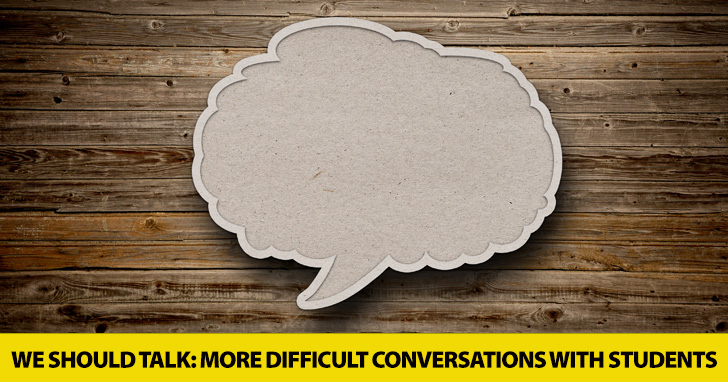We Need to Talk: 6 Conversations to Have with “Difficult” Students


Most of us would do anything to avoid the conversation, on other side. When we are the ones who need to initiate the conversation, we might try first limiting contact with the other party, ignoring the offending behavior, “dropping hints” or trying to state the problem indirectly, etc. None of these are likely to be effective. Sometimes the direct “we should talk” strategy is the only reasonable one. Thankfully, only one or two of these conversations with students are usually necessary per semester, on some predictable issues. There are also specific strategies to make the conversation go more smoothly.

There are often one or two students who apparently feel comfortable coming in late and then needing to be caught up on what the class is doing and interrupting a discussion. There are also those students—or sometimes the same ones—who leave early, perhaps distracting a student or the instructor while presenting. Such late arrivals and early departures interrupt the class and are discourteous to other class participants.
Other discourteous behavior, beyond coming in late or getting up and leaving before the end, are passive-aggressive behaviors that also reflects on student attitude toward the class. Passive-aggressive behaviors—that is, not openly threatening but still hostile—include eating, sleeping, and texting while in class. It may also include other behaviors such as completing the work of other classes while in class. While passive-aggressive behaviors may actually reflect something else—e.g., sleeping in class out of actual exhaustion rather than rudeness—this behavior is often intended as a challenge to the rules and expectations of the class, but as its name suggests, is an indirect rather than direct challenge.
Beyond passive-aggressive behavior is the openly aggressive: deliberate rudeness, threats against the instructor and/or other students, and harassment, such as sexual. “Harassment” is sometimes today called “bullying.”
Another “we should talk” conversation is the discussion about poor performance in class, with work not submitted at all, not according to directions, or of unacceptable quality. This conversation is important because, unlike with aggressive or passive-aggressive behavior, the student is not necessarily consciously choosing to perform poorly, is in denial about it, and may be shocked about a poor final grade.
A final important conversation is regarding student work plagiarized or other form of cheating within the class. This is an especially important conversation due to possible lack of awareness: the student may have an incomplete understanding of what plagiarism is, for example, or not be aware that the teacher knows he or she cheated.

A first step in the difficult conversation is to address the issue with the class as a whole. This way the “offending” student is not singled out and the whole class is reminded of the attendance policy, for example, or the definition and penalties of academic dishonesty. These concerns may actually be problems for more than one student, and may recognize themselves enough to cease the behavior before even needing to be approached individually.
There are those times, however, the student really doesn’t see himself in the problem behavior discussed or chooses to ignore the discussion. It is then time to request that the student see you alone, either before or after class, or in your office, if possible. The conversation, however, should take place in a private and calm atmosphere and not “on the fly” in front of other students.
This is the most difficult part of the conversation, getting to the problem. However, it is necessary to quickly get to the concern without too much preamble of “How are you?” and “Did you have a good weekend?” small talk. A good way to begin is “Something we should talk about is—” or “I am concerned about—” This is a nonthreatening and non-accusatory stance, suggesting collaborating in a change and keeping the focus on your perceptions, rather than assuming the student’s or telling him what he thinks and feels.
Along with not assuming what students think and feel is directly asking for their thoughts on the matter. You may be surprised—the student may have an entirely different than expected perception about his or her work, for example, seeing marginal work as acceptable, which may indicate a need for tutoring.
It’s really not enough to tell the student how terribly she’s been performing. What she can do about it is also required: “Come to class on time. Stay the entire time out of courtesy to the class…” and so forth. This reinforces the expectations of the class and lets the student what she may do to remedy the situation.
Once the desired change has been stated, the compliance with the changed behavior has to be enforced. Give a deadline and consequences. “You must submit your paper by the end of the week or risk failing the class” is an example of a deadline and consequence.
There are always cases that are the exception and should be noted. This more rationale and kinder approach of recognizing exceptions is more appropriate to students whose behavior is merely annoying or harmful to herself, mostly, rather than threatening to others. If a student is consistently late due to real and significant personal and/or professional commitments, then special accommodations may be considered for that student.
However, there are students who demonstrate behavior that is offensive and/or harmful to others. In this case, a swifter and stronger approach is necessary, with the desired change and deadline for that change stated decisively: “I must ask you to cease the abusive language at once or you will need to leave class immediately and not come back for two days, during which you will not be able to make up work.”
Difficult conversations are just that: difficult, and therefore, many avoid having them. However, when these conversations cannot be avoided, there are several strategies, such as catching the student alone and stating the problem, actively listening, and requesting a change in clear terms, that will make the conversation productive, if not actually pleasant.